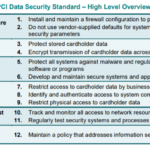In a world increasingly dependent on digital transactions, the article “Understanding the Impact of PCI-DSS Compliance on Small Businesses” provides key insights into the unique challenges and advantages that small enterprises face while implementing and adhering to Payment Card Industry Data Security Standards (PCI-DSS). This piece offers an in-depth exploration of the complex interactions between PCI-DSS compliance and small business dynamics, focusing on its influence on security protocols, financial soundness, and customer trust.
Understanding PCI-DSS
Definition of PCI-DSS
PCI-DSS, or the Payment Card Industry Data Security Standard, is an international data standard required by all card brands for organizations that handle payments from the major credit card schemes, including Visa, MasterCard, and American Express. This standard is intended to protect customer data and endorses principles for managing and safeguarding such information, also known as cardholder data.
Importance of PCI-DSS
The PCI-DSS is critically important in the digital landscape of online commerce. Its importance stems from its central role in securing customer data transactions and preventing data breaches. In an environment where instances of cybercrime are increasingly common, having strict security measures prevents fraudulent activities and increases customer confidence in your organization’s ability to secure their data.
PCI-DSS Compliance for Small Businesses
Overview of PCI-DSS Compliance
PCI-DSS compliance is about adhering to a set of standards designed to secure payment cardholder data. These standards include creating and maintaining a secure network, protecting cardholder data, maintaining a vulnerability management program, implementing strong access control measures, regularly monitoring and testing networks, and maintaining an information security policy.
Why PCI-DSS Compliance is Necessary for Small Businesses
Small businesses might think that they’re immune to data breaches or other cybersecurity threats due to their size. However, this misconception leaves them vulnerable. Small businesses are often easier targets for hackers because they lack robust security measures. PCI-DSS compliance isn’t simply about ticking a regulatory box; it’s about taking appropriate steps to protect your customers and your business.
The Impact of PCI-DSS Compliance on Small Business Operations
Changes to Business Processes
Implementing PCI-DSS compliance may require changes to business processes. This could mean altering the workflow for processing payments to include additional layers of security or modifying how customer data is stored and accessed.
Policies and Procedures Modifications
Compliance also typically necessitates changes in policies and procedures. That may involve writing new procedures outlining how payment information is handled, or adjusting existing policies to ensure appropriate access controls are in place.
Technological Investments Required
For many small businesses, achieving PCI-DSS compliance means investing in new technology. This might include purchasing encrypted card readers or payment software that meets PCI-DSS standards, or even hiring experts to ensure proper setup and maintenance of your systems.
The Financial Implications of PCI-DSS Compliance
Cost Estimates of Becoming Compliant
The cost of becoming PCI-DSS compliant can vary widely based on your business’s size and complexity. Costs may arise from necessary hardware upgrades, software purchases, external consultant fees, and ongoing maintenance costs.
Potential Financial Risks of Non-compliance
Non-compliance risks can be substantial. In the event of a data breach, any company that is found to be non-compliant with PCI-DSS could face heavy fines, litigation costs, reputation damage, and loss of customer trust, all of which could lead to substantial financial losses.
The Role of PCI-DSS in Fraud Prevention
How PCI-DSS Reduces Fraud
By implementing the rigorous security measures spelled out by the PCI-DSS, businesses can drastically reduce the likelihood of credit card fraud. These measures help to protect against both external threats, such as hackers, and internal threats, such as employees misusing customer information.
The Relationship Between Fraud Rates and PCI-DSS Compliance
Studies have consistently shown that businesses that are PCI-DSS compliant have lower rates of fraud than non-compliant businesses. This is because the security controls enforced by the PCI-DSS protect against the common techniques used by fraudsters to gain unauthorized access to cardholder data.
How PCI-DSS Compliance Affects Customer Trust
Improvement in Customer Confidence
One of the most significant benefits of achieving PCI-DSS compliance is the increase in customer confidence. When customers know that a business is doing everything in its power to protect their sensitive data, they are more likely to trust that business with their information.
Impact on Customer Relationships and Loyalty
Failing to secure customer data can lead to a significant loss of trust, which is difficult to rebuild. Compliance with PCI-DSS not only helps prevent such situations but also sends a clear message to customers that their security is a top priority. This can enhance customer relationships and foster greater loyalty.
Case Studies: Small Businesses and PCI-DSS Compliance
Real-world Examples of Compliance
Many small businesses have successfully navigated the journey to PCI-DSS compliance. For instance, one family-owned retail store overcame the hurdles of implementing a secure network, managing access control measures, and creating effective security policies, demonstrating that compliance is possible even for small businesses.
Lessons learnt from Non-compliance Cases
Yet, there are also cautionary tales of businesses that failed to comply and consequently suffered a data breach, resulting in substantial financial losses and reputational damage. These cases serve as a stark reminder of the importance of PCI-DSS compliance for every business, regardless of its size.
Overcoming Challenges in Achieving PCI-DSS Compliance
Understanding and Navigating Compliance Challenges
There are numerous challenges in achieving PCI-DSS compliance, but they can be navigated with thorough understanding and preparation. Challenges may include lack of technical skills, resource constraints, or navigating the complex requirements of the standards.
Available Support and Resources for Small Businesses
Numerous resources and support services are available to help small businesses achieve PCI-DSS compliance. These include industry forums, free online resources, specialized consultants, and technology vendors.
Future Trends in PCI-DSS and Small Business Compliance
Anticipated Changes in Standards
As technology evolves and cyber threats become more sophisticated, the PCI-DSS is expected to change and adapt to ensure continued protection of cardholder data. Businesses must be prepared to adapt and update their security measures accordingly.
Impact on Small Business Compliance Strategies
Trends such as increasing remote work, proliferation of mobile payments, and the rising use of cloud services are likely to affect compliance strategies, making flexibility, scalability, and continuous monitoring increasingly crucial.
Conclusion: Weighing the Costs and Benefits of PCI-DSS Compliance
Long-term Benefits for Small Businesses
Despite the challenges and costs involved, achieving and maintaining PCI-DSS compliance offers long-term benefits. These include a secure business environment, a strengthened reputation, improved customer trust, and potentially reduced incidence of costly data breaches.
Balancing Compliance Costs with Business Goals
Ultimately, the implementation of PCI-DSS should be regarded as a strategic investment. While implementing these measures might require sizable upfront costs, non-compliance could lead to much more significant losses. It is crucial to balance these costs with business goals and the potential significant repercussions of non-compliance.









